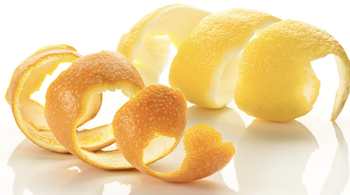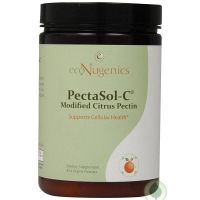Modified Citrus Pectin
Other common name(s): citrus pectin, Pecta-Sol®, MCP
Pectin is a complex carbohydrate molecule found in most plants but especially citrus fruit. Pectin is used in making jellies and is an ingredient in some anti-diarrhea medicines. The long-chain molecule found in grocery store pectin is not absorbed by the body. Modified Citrus Pectin is made from shorter molecular chains and is readily absorbed from the intestinal tract. Pecta-Sol fights the spread of cancer by preventing or inhibiting metastases. Cancer cells are particularly susceptible to having Modified Citrus Pectin attach to them because of the nature of their cell membranes. Once the Modified Citrus Pectin has attached itself to the cancer cells floating in the blood stream, the cancer cells become coated and unable to attach themselves to the lining of blood vessels or other potential metastatic sites. This process can only occur in the bloodstream, hence the importance of allowing the short chained pectin to be absorbed by the body. It is often recommended to take this product with PCSpes.
Special Precautions of MCP
This product is sold as a dietary supplement in the United States. Unlike drugs (which must be tested before being allowed to be sold), the companies that make supplements are not required to prove to the Food and Drug Administration that their supplements are safe or effective, as long as they don't claim the supplements can prevent, treat, or cure any specific disease. Some such products may not contain the amount of the herb or substance that is written on the label, and some may include other substances (contaminants). Actual amounts per dose may vary between brands or even between different batches of the same brand. Most such supplements have not been tested to find out if they interact with medicines, foods, or other herbs and supplements. Even though some reports of interactions and harmful effects may be published, full studies of interactions and effects are not often available. Because of these limitations, any information on ill effects and interactions below should be considered incomplete. Citrus pectin is categorized as "generally regarded as safe" by the U.S. Food and Drug Administration, When MCP is used as intended, side effects rarely occur. However, some people may experience stomach discomfort after taking MCP. There have been a few case reports in which asthma developed in people after exposure to powdered pectin. Modified citrus pectin may cause serious allergic reactions in those who are allergic to citrus fruits.Relying on this type of treatment alone and avoiding or delaying conventional medical care for cancer may have serious health consequences.
The benefits of MCP are
- Cancer : Several animal studies found that MCP helped reduce the spread of prostate, breast, and skin cancer. Animals with these types of cancer that were fed MCP had a much lower risk of the tumor spreading to the lungs. For example, one study examined the effects of MCP on lung metastases from melanoma cells. Researchers injected mice with melanoma cells. In the mice that were also given MCP, significantly fewer tumors spread to the lungs than in the mice that did not receive the drug. When lung tumors did develop in the mice treated with MCP, the tumors tended to be smaller than those that formed in untreated animals.These studies appear to show that MCP makes it difficult for cancer cells that break off from the main tumor to join together and grow in other organs. However, in most animal studies, MCP had no effect on the main tumor, suggesting that it may only be useful for preventing or slowing the growth of metastatic tumors in very early stages of development.Recent laboratory studies of human and animal cells have provided information on how MCP might slow the spread of cancer. MCP appears to attach to galectin-3, a common chemical in many cells. Galectin-3 is present in abnormally high levels in many cancers and plays an important role in the growth, survival, and spread of cancer cells.Although animal and cell studies are quite encouraging, very little information is available about whether MCP is effective in humans. In one published clinical trial, 10 men with prostate cancer were treated with MCP after standard treatment failed. In 7 of these men, blood tests found prostate-specific antigen (PSA, a marker of prostate cancer growth). Their PSA doubling time (a measure of how fast PSA goes up) improved in comparison with measurements done before taking MCP, indicating that MCP may have a slowing effect on the cancer's growth. This study had no control group (in this case, a group of men who did not take MCP), which limits the strength of its conclusions on MCP's effectiveness. It also did not measure survival or other important endpoints. However, taken with the information gained from animal studies, it suggests that MCP may have a role in reducing the growth and spread of cancer. Randomized controlled trials looking at larger groups of people must be done before any firmer conclusions can be reached.
- Inflammatory Diseases : The wide-ranging success of this MCP against both acute and chronic inflammatory conditions, is largely derived from its unique relationship with the causative biomarker molecule, galectin-3 (Gal-3). Thousands of published studies, including large-scale cohort data, identify Gal-3 as an upstream driver of inflammatory, fibrotic and oncogenic diseases.
- detoxing : modified citrus pectin (MCP), a remarkable substance made from the inner peel of citrus fruits. MCP is one of the most powerful chelating agents I’ve ever researched -- and it’s been proven effective in human clinical studies. In one recent study, USDA scientists gave people MCP for six days. (The scientists measured the amount of toxins in the participants’ urine before and 24 hours after taking the supplement.The results were pretty amazing...The amount of deadly arsenic excreted in participants’ urine increase by 130%. The amount of toxic mercury excreted increased by 150%. The amount of cadmium excreted increased by a whopping 230%. And the amount of toxic lead excreted in participants’ urine increased by an amazing 560%!

